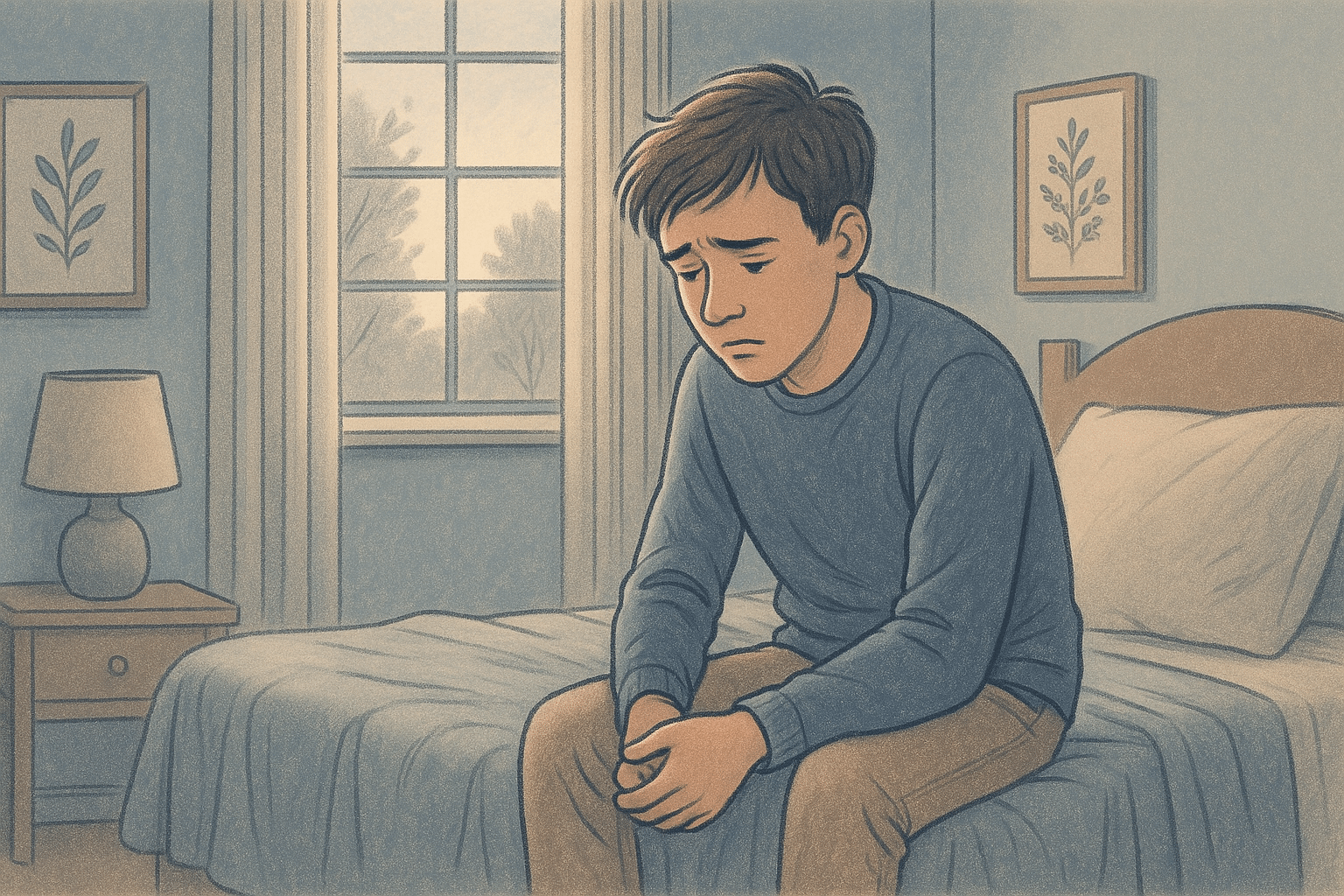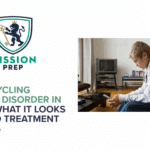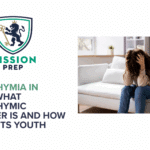Key Takeaways
- Bipolar disorder in teens often manifests differently than in adults, with more rapid mood cycles and irritability rather than euphoria during manic episodes.
- Warning signs include extreme mood swings that last for days or weeks, uncharacteristic risk-taking behavior, and significant changes in sleep patterns.
- While typical teen moodiness is normal, bipolar symptoms are more intense, longer-lasting, and significantly impact daily functioning.
- Early intervention is critical. Proper diagnosis and treatment can significantly improve long-term outcomes for teens with bipolar disorder.
- Mission Prep Healthcare specializes in adolescent mental health with comprehensive inpatient and residential programs designed specifically for teens with bipolar disorder, providing 24-hour support, specialized treatment approaches, and family involvement in the recovery process.
Teen Bipolar Warning Signs
Bipolar disorder is characterized by distinct episodes of mania (or hypomania) and depression that represent significant changes from a teen’s normal mood and behavior. These episodes typically last for days or weeks and may occur several times a year. The pattern and severity of these episodes vary widely among individuals, which is why careful observation and professional assessment are crucial.
The most telling sign of bipolar disorder in teenagers is the presence of clear mood episodes that are noticeably different from their usual behavior. While all teens experience mood swings, bipolar episodes are more extreme, last longer, and significantly impact the teen’s ability to function in daily life. These mood shifts often occur without an obvious trigger and may seem completely out of character for the teen.
Mission Prep Healthcare specializes in mental health treatment for teens aged 12-17, offering residential and outpatient programs for anxiety, depression, trauma, and mood disorders. Our therapies include CBT, DBT, EMDR, and TMS, tailored to each adolescent’s needs.
With a structured, supportive environment, we integrate academic support and family involvement to promote lasting recovery. Our goal is to help teens build resilience and regain confidence in their future.
Manic Episode Symptoms

Manic episodes in teens can be particularly disruptive and are characterized by periods of abnormally high mood and energy.
Unusual Energy Levels
During manic episodes, teens often display boundless energy that seems almost supernatural. They may need significantly less sleep yet still wake up feeling energized. This hyperactivity isn’t just physical but mental too, with racing thoughts that jump quickly from one idea to another. You might often describe your thoughts as being “on overdrive” or “impossible to keep up with” during these periods.
Sleep Changes
One of the most reliable indicators of a manic episode is a dramatic decrease in the need for sleep without feeling tired. A teen experiencing mania might sleep just 3–4 hours a night (or not at all) yet still feel energetic the next day. This is distinctly different from a teen who stays up late by choice and then struggles with fatigue. The reduced need for sleep typically persists for several days during a manic episode and is not accompanied by the expected tiredness.
Impulsive Behaviors
During manic episodes, teens often engage in uncharacteristically risky behaviors with little consideration for consequences. This might include sexual promiscuity, reckless driving, or excessive spending. What distinguishes these behaviors from typical teen risk-taking is their sudden onset, intensity, and departure from the teen’s usual personality.
These impulsive actions can lead to serious consequences, including legal troubles, damaged relationships, financial problems, or physical harm.
Rapid Speech
Pressured speech is a hallmark symptom of mania in teenagers. You might talk unusually fast, jump between topics without logical connections, or seem unable to stop talking despite others’ attempts to interject. This rapid speech pattern reflects the racing thoughts occurring in your mind and often makes it difficult for others to follow your train of thought.
Depressive Episode Symptoms

The depressive episodes of bipolar disorder can be just as disruptive as manic episodes and often last longer.
Persistent Sadness
During depressive episodes, teens experience profound sadness that goes well beyond typical teenage moodiness. This sadness persists regardless of circumstances and doesn’t improve with positive events or encouragement. You might express feelings of emptiness, worthlessness, or hopelessness about the future. Some describe it as feeling “numb” or “dead inside” rather than merely sad.
Unlike situational sadness that has a clear trigger and eventually resolves, the depression associated with bipolar disorder seems to come “out of nowhere” and doesn’t improve with time or support alone.
Energy Loss
The fatigue experienced during bipolar depression goes far beyond normal tiredness. You may struggle to get out of bed, complete basic hygiene routines, or engage in even minimal physical activity. Simple tasks like showering or preparing a meal can feel overwhelming. This profound lack of energy dramatically contrasts with your energy levels during manic episodes.
Sleep Disturbances
While manic episodes typically cause decreased need for sleep, depressive episodes often lead to sleep problems of a different nature. You might sleep excessively, sometimes 12 hours or more. yet still wake feeling unrefreshed. Alternatively, you might experience insomnia despite feeling exhausted, lying awake for hours unable to fall asleep.
Social Withdrawal
During depressive episodes, teens often withdraw from friends, family, and previously enjoyed activities. You may decline social invitations, quit sports teams or clubs, or spend increasingly more time alone in your room. This withdrawal goes beyond the typical teenage desire for privacy and represents a significant change from your usual social patterns.
Physical Complaints
Depression can manifest physically in teens with bipolar disorder. You might frequently experience headaches, stomachaches, or general malaise with no identifiable medical cause. These physical symptoms are real, not imagined, and represent the mind-body connection in mood disorders.
Normal Teens vs. Bipolar
Duration of Symptoms
Typical teenage mood changes rarely last more than a day or two, while bipolar mood episodes persist for extended periods, at least 4 days for hypomania, 7 days for full mania, and 2 weeks for depression according to diagnostic criteria. This sustained nature of mood disturbance is one of the most reliable indicators that something beyond normal teenage development is occurring.
Intensity Differences
The intensity of bipolar mood episodes far exceeds typical teenage emotions. During mania, you may go days with minimal sleep, engage in dangerous behaviors without concern for consequences, or develop grandiose beliefs about your abilities.
During depression, you may become completely withdrawn, express suicidal thoughts, or be unable to function in school or social settings. These extreme states represent a significant departure from the teenage baseline personality and behavior.
Impact on Functioning
Perhaps the most telling difference between normal teen behavior and bipolar disorder is the impact on day-to-day functioning. Typical adolescent mood swings rarely prevent teens from attending school, maintaining friendships, or participating in activities they enjoy.
In contrast, bipolar episodes significantly disrupt normal functioning, often leading to academic decline, relationship conflicts, and withdrawal from previously enjoyed activities.
When to Seek Help

Recognizing when to seek professional help for potential bipolar symptoms is crucial for early intervention.
Crisis Warning Signs
Some situations require immediate intervention rather than waiting for a scheduled appointment. If you notice suicidal thoughts, engage in self-harm, experiences psychotic symptoms (like hallucinations or delusions), or shows dangerous impulsivity during manic episodes, emergency mental health services should be accessed immediately. Most communities have crisis response teams or emergency psychiatric services available through local hospitals.
Don’t hesitate to call 988 (the National Suicide Prevention Lifeline) or go to the emergency room with your parents if you’re concerned about immediate safety. Remember, addressing a crisis promptly both protects you and creates an opportunity for proper assessment and treatment.
Finding the Right Doctor
For bipolar disorder assessment and treatment, a child and adolescent psychiatrist offers the most specialized expertise. These physicians have completed additional training specifically in youth mental health and have experience differentiating between normal development, behavioral issues, and serious mood disorders.
A comprehensive evaluation typically involves multiple sessions, collateral information from parents and sometimes teachers, and standardized rating scales to assess symptom patterns.
What to Tell Your Parents
When approaching your parents about seeking help, focus on specific behaviors you’ve observed rather than labeling or diagnosing them. Express concern about changes you’ve noticed and emphasize that getting help demonstrates strength, not weakness.
Involve them in the process and allow them to have a voice in treatment decisions while maintaining appropriate parental guidance.
Finding Hope and Healing at Mission Prep Healthcare
At Mission Prep Healthcare, we recognize that bipolar disorder in adolescents presents unique challenges that require specialized care and deep understanding of teenage development.
Our comprehensive approach to treating bipolar disorder in teens combines evidence-based medical treatment with compassionate, age-appropriate therapy in a supportive environment. We understand that behind every mood episode is a young person struggling to make sense of overwhelming emotions and experiences.

Our inpatient and residential programs provide the intensive support and care necessary for stabilization while building the long-term skills needed for lasting recovery.
What sets Mission Prep apart is our commitment to treating the whole person, not just the symptoms. We involve families in the healing process, recognizing that bipolar disorder affects everyone who loves you. Our experienced team of child and adolescent psychiatrists, therapists, and support staff work collaboratively to create individualized treatment plans that address each teen’s specific needs, strengths, and goals.
If you’re concerned about bipolar symptoms, don’t wait. Early intervention can make a profound difference in long-term outcomes. Contact Mission Prep Healthcare today to learn how we can help you manage this challenging journey toward healing and hope.
Frequently Asked Questions
Can bipolar disorder suddenly appear in teenagers?
While bipolar disorder doesn’t typically emerge overnight, the first noticeable episode (particularly a first manic episode) can seem to appear suddenly. In retrospect, most teens have experienced milder symptoms or mood fluctuations for months or years before a significant episode brings the condition to clinical attention. Stressful life events or significant hormonal changes during puberty can sometimes trigger the first full episode in genetically vulnerable individuals.
Is bipolar disorder hereditary in teens?
Bipolar disorder has a strong genetic component, with research suggesting that 80–90% of cases are attributable to genetic factors. Having a first-degree relative with bipolar disorder increases a teen’s risk by approximately 8–10 times compared to the general population. However, genetics aren’t the sole determinant, environmental factors like significant stress and trauma can trigger the expression of genetic vulnerability.
How is teenage bipolar disorder treated?
Treatment typically involves a comprehensive approach combining medication (mood stabilizers, antipsychotics, carefully monitored antidepressants), psychotherapy (CBT, family-focused therapy, interpersonal and social rhythm therapy), education, and lifestyle management. The most effective treatment plans address the whole person, including physical health, sleep habits, stress management, and academic accommodations when needed.
Can teens outgrow bipolar disorder?
Bipolar disorder is generally considered a lifelong condition that requires ongoing management rather than something teens will outgrow. However, with proper treatment, many individuals achieve excellent symptom control and lead fulfilling, productive lives. Early intervention typically leads to better long-term outcomes, including longer periods of stability between episodes and improved functioning.
What makes Mission Prep Healthcare different for treating teen bipolar disorder?
Mission Prep Healthcare offers specialized inpatient and residential programs designed specifically for adolescents with bipolar disorder. Our approach combines 24-hour psychiatric care with evidence-based therapies, family involvement, and peer support in a safe, structured environment. We focus on crisis stabilization, long-term coping strategies, and building resilience, with treatment plans customized to each teen’s unique needs and developmental stage.





















